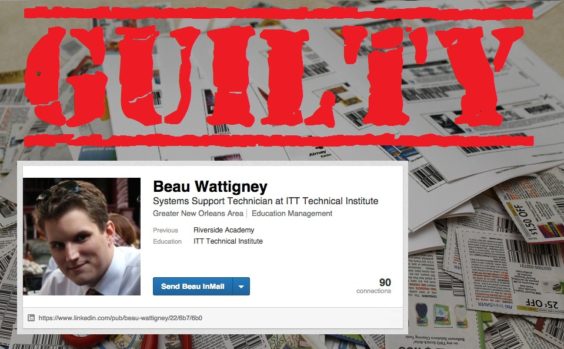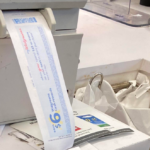
A New Orleans man faces up to several decades in prison and millions of dollars in fines and restitution, after pleading guilty to selling counterfeit coupons online and bilking companies out of at least a million dollars – and possibly much, much more.
30-year-old Beau Wattigney pleaded guilty in federal court Wednesday, to conspiracy to commit wire fraud and conspiracy to commit trademark counterfeiting. The guilty pleas come just two months after he was charged with running his fraudulent coupon scheme for at least two and a half years.
By pleading guilty, Wattigney admitted to creating thousands of counterfeit printable coupons and selling them on the “Dark Web”. Inaccessible to amateur web-surfers, and hidden behind layers of encryption that conceal users’ identities and locations, underground black markets such as the Silk Road have become infamous for their open trafficking in illegal and counterfeit goods such as drugs, weapons – and coupons.
But Wattigney wasn’t as anonymous as he had hoped. “We’d been watching him for quite a while,” Brand Technologies president Jane Beauchamp told Coupons in the News. More than a year ago, working on behalf of manufacturers and coupon issuers, independent investigators with Brand Technologies discovered a Silk Road vendor store run by “PurpleLotus”, selling custom-made counterfeit manufacturer’s coupons. After making some undercover purchases, and working with the FBI, they were able to identify Wattigney, a systems support technician at ITT Technical Institute, as being the “PurpleLotus” himself.
Wattigney admitted to selling more than two thousand coupons made to look like legitimate printables from Coupons.com, SmartSource, RedPlum and Hopster. Most were higher-value versions of the types of coupons you’d use in the grocery store – but instead of 50 cents off, they might give you 10 dollars off. One coupon even allowed users to get a $50 Visa gift card for just a penny.
And if that sounded too unbelievable to even try to get past a cashier, no worries. “You take it to Walmart and use the self checkout,” Wattigney was said to have advised a buyer. “Can tell you with certainty it works at Walmart, just don’t use any other coupons, and try to catch the attendant when they are walking around or busy helping a customer.”
Prosecutors say Wattigney made about $75,000 selling his counterfeits. But he’s now on the hook for the total face value of the coupons themselves. Court documents state that manufacturers’ total losses were “in excess of $1 million”, but investigators believe the final tally – which Wattigney will likely be ordered to pay back in the form of restitution – could end up being many times that amount.
“As this case demonstrates, any of Wattigney’s meager gains have been, or soon will be, lost,” Coupon Information Corporation Executive Director Bud Miller said in a statement. “Individuals engaged in creating, selling, or purchasing counterfeit coupons put themselves at far greater risk than the perceived temporary rewards such illegal activities may provide.”
“The impression that fraudsters have, regarding their behaviors going under the radar of law enforcement, is a poor assumption on their part,” Beauchamp added.
Wattigney faces a maximum sentence of 20 years in prison and a $250,000 fine for the wire fraud charge, and 10 years plus a $2 million fine for conspiracy to commit trademark counterfeiting. He’s likely to receive considerably less than that, when he’s sentenced in October. But any penalties will come on top of restitution that he’s expected to pay to more than 50 companies victimized in the scheme.
The coupon industry is engaged in a constant battle against counterfeiters, and federal authorities are vowing to pursue their own battle against those who sell fraudulent creations of any kind online. “The Criminal Division is determined to peel back the veil of anonymity and prosecute criminals of all stripes who attempt to use the ‘dark web’ to cloak their illegal conduct,” Assistant U.S. Attorney General Leslie Caldwell said when Wattigney was charged.
Wattigney is now out on bond, awaiting his fate. He can perhaps take some solace in the knowledge that his penalty won’t be quite as severe as the one imposed on the founder of the Silk Road, which Wattigney used to sell his creations. Ross Ulbricht was convicted earlier this year for his role in setting up the online marketplace – and was sentenced to life in prison. His mother called the penalty a “draconian ruling” that “sent shock waves worldwide.”
Wattigney’s sentencing may not have quite that impact. But if it sends shock waves through the counterfeit couponing community, where PurpleLotus protégés are still using his templates to make their own counterfeits, the coupon industry hopes to chalk it up as a significant victory.
“The blatant disregard that Mr. Wattigney had for retail commerce and the ‘currency’ of coupons is a legacy that is going to be around for a while to come,” Beauchamp said. “I think it would be wise for folks to reconsider using the templates PurpleLotus provided, or they might have store loss prevention staff and federal law enforcement officers meet them at the exit door.”
Wattigney himself had already gotten out of the counterfeit coupon business at the time he was charged, having announced his “retirement” as investigators closed in. “I must move on with my real life,” PurpleLotus wrote in a message to his customers. “No matter how great all of my customers felt about me and my customer support and all the other great compliments I received… I can’t exactly put this on my résumé.”
Now, as a convicted felon, he may no longer have a choice.
Foreground photo from LinkedIn / Background photo by rose3694











Pingback: Consumers Warned Against Counterfeit Coupons, ConsequencesLiving Rich With Coupons®
I would love to link to this article since it is based in my home state.
http://www.coupongirlsla.com / Please let me know if I can?
Thank you.
Of course, feel free!
People used to think I was crazy when I spoke of the “coupon underground”.
It really does exist!
http://www.howtoshopforfree.net/grocery/make-75000-00-selling-counterfeit-coupons-and-then-go-directly-to-jail/
Pingback: Counterfeit Coupons lands man in jail | How to Shop For Free with Kathy Spencer